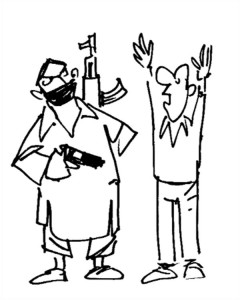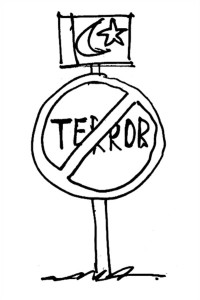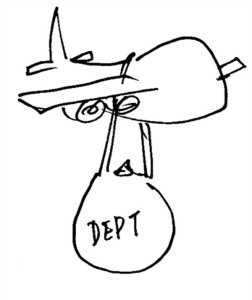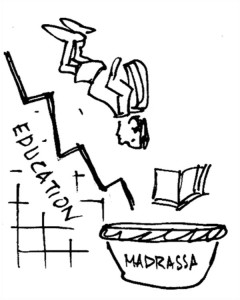
Cyber warfare

Sir,
Back in 2001, when I was in Germany’s prestigious Tubingen University, I met a large number of Indian students who were employed as computer experts by German companies. I also noticed that there were no Hindu asylum seekers (although there were some people from the Sikh community who have been facing discrimination back in India). Indian students were very confident, and that was because of their pride as well as their performance. Credit goes to Indian policymakers for introducing an information technology policy early enough to enter the 21st Century computer age with broad national objectives in mind.
India has computerized almost all its departments, especially those related to security and war. It has developed a cybercrimes policy that is being followed by its intelligence agencies for surveillance and counterintelligence etc. There are reports that Edward Snowden made a secret visit to India nearly three years before the leaks he became famous for, where he spent days taking courses in ethical hacking and programming at a local professional school, where he learned advanced techniques for breaking into computer systems and exploiting flaws in software. Snowden also learned about methods to reverse-engineer the world’s most popular kits for committing widespread online crime. This shows how much India has advanced itself in this field.
In Pakistan, so far we are still trying to familiarize ourselves with laptops and other electronic gadgets. This lack of interest and expertise on our part has made us prone to cyber-attacks, media onslaughts and internet intrusions. Over a decade ago, the US had installed a major-general as the head of the Cyber Warfare branch of its army, followed by India. Pakistan Army lags behind in this regard, and that is a serious cause of concern. Our armed forces need to be upgraded, modernized, sophisticated and equipped to cope with the emerging challenges. Acquiring latest technology and its know-how is a must. Although I do not underestimate our people’s expertise in computers and IT, there is a great scope for enhancing this knowledge and expanding it to all areas of the national mainstream.
Alya Alvi,
Rawalpindi.
If guns are outlawed

Sir,
In Pakistan, laws are only for the law abiding. The government has been unable to protect its citizens against well-armed criminals who may strike anyone, anywhere and anytime with impunity. But its weapons policy has deprived law abiding citizens of quality arms and ammunition to help them exercise their right of self-defense.
Arms license fees are periodically increased to boost revenue, which means self-defense is heavily taxed and discouraged. As such, the policy has unwittingly improved the safety of the criminals.
Some drawing-room intellectuals express fears that if law-abiding citizens were permitted to carry arms, Pakistan would become lawless. What they don’t realize is that right now it is even worse.
When law abiding Americans were well armed with license-free weapons and could carry them anywhere for self-defense, they fought back against criminals and assisted the police. Even now, many Americans carry handguns for self-defense outside their homes. “If guns are outlawed,” says a popular NRA slogan, “only outlaws will have guns.”
At present, there are at least 20 times as many illegal arms in Pakistan than licensed ones. That is why it would be better for the government to go after armed criminals, rather than arms.
I humbly appeal to the government to kindly organize the armed law-abiding citizens to assist the security forces in locating and arresting criminals. The security forces cannot do it alone, as proved so far despite countless sacrifices.
M Akram Niazi,
Rawalpindi.
Wakeup call

Sir,
When will we realize that our country is in a state of war? It is a situation of emergency. The Taliban have now started dictating us, on TV and through TV anchors. Their strategy has changed. They are trying to create fear among the people of Pakistan.
The talks offer by the Taliban and a powerful bomb blast close to the GHQ at the same time is a clear message that they are not serious. They are leaving us with no option but to fight. Then shouldn’t we fight? We must leave behind political bickering, and join hands to differentiate between Pakistanism and Talibanism, and strengthen the hands of our armed forces, security institutions and law enforcement agencies to be fully able to fight out terrorists. The armed forces have fought terrorists whenever they have been tasked to, but who is fighting the ideology of Taliban?
Most of us are still wandering in wilderness as to who is right and who is wrong. That is mostly because our governments have not performed well. They have not been able to bring back effective governance to the post-operation areas. The media is not sensing the seriousness of the situation. The state and the government machinery are not doing their due, to train and educate people in civil defense.
Instead of talking about what is happening in Syria or Libya, our educated lot needs to start worrying about what is happening in Pakistan. We must wake up and save Pakistan from terrorists, extremists, sectarian militants, and the corrupt ruling elite.
Abid Aleem,
Islamabad.
Let it fly

Sir,
The PIA has said that the induction of three A320s – between six and seven years old – “will cut the revenue gap to the maximum possible”.
What they forget is that when the B777 Business Plan was submitted in 2002, the airline was expected to become profitable by 2010. What actually happened was that losses had tripled by 2010.
One expensive seven year old B777, which cost the national exchequer almost $155 million, has been grounded for the last seven months. Its parts and one engine have been taken out so that other eight B777s could fly.
This proves that while fuel efficient new aircraft make a difference, it is primarily the management that will make these expensive aircraft either an asset or a drag for the airline.
Can anyone justify the recruitment of another 250 trainee pilots when the PIA already has surplus pilots on payroll, almost over 610 for roughly 25 serviceable aircraft (with yet another fabulous salary raise in April-May 2013), for an airline posting highest net loss in a year and the utilization of both fleet and crew at its lowest.
This onslaught of mismanagement, nepotism and corruption will render the PIA bankrupt, unless the government moves in and carries out a surgical cleansing of the rot that dominates its executive corridors. It has the option of sacking them, or else making the future of over 18,000 employees fraught with consequences of an impending shutdown.
A Malik,
Lahore.
Primary lessons
Sir,
The basic problem with Pakistan is that no clear long-term policy has ever been implemented to tackle the ever increasing gap in education amongst economic classes. By gap, I refer specifically to the quality of educational provisioning and how it differs as you climb up the socio-economic ladder.
A good place to start is Tariq Rahman’s Denizens of the Alien world which broke down the basic primary educational structure into four main categories: elitist schools, public schools, madrassas and the army managed cadet colleges. The Annual Status of Education Report (2012) has expounded on these inequalities by dividing the population into four quartiles namely poorest, poorer, richer and richest. The results exhibited that the lowest household rung had the highest percentage of children enrolled in government schools at 91% and only 9% in private-schools. The top quartile, on the contrary, had an alarming 40% enrolled in private schools and 60% in government schools. The report goes on to claim that a high correlation is found between wealth and enrollment in private schools, quite in line with Rahman’s analysis. Not so divergently, a high correlation is also found between learning levels (of Mathematics, English and Reading) and wealth.
Even if we ignore that meager 55% national literacy rate, even the ones that acquire primary schooling have very different futures ahead: some move on to elite secondary schools whilst most at the bottom learn nothing substantial from public schools. Combine the poor quality of learning, high indirect cost in form of lost child-labor wages and meager private returns from state-funded public education, the result you would get is a high-drop-out rate at primary level. National literacy is thus itself connected with the success of public schools.
According to the Pakistan’s federal budget 2013-2014, the entire amount allocated to education is $0.58 billion (roughly 7% of what United States spends on pre-primary education alone). Furthermore, the difference in the quality and size of the public program can be judged by the fact that in the year 2009-2010, 34 million children attended 98,917 public elementary schools across the United States compared to only 12 million children who attended 138,000 public primary schools across Pakistan.
Though the count of public schools in Pakistan may exceed over 130,000 across the four provinces, there is no guarantee whether these schools have adequate provisioning of electricity and water or whether they exist at all.
Building schools is not enough if they lack the infrastructure or are displaced from the population they cater to. Educational may be a constitutionally endowed right but the rural poor, the few who do, have to walk kilometers to schools with no bathroom facilities and teachers who are not trained or motivated enough to pass on their limited knowledge.
Khawaja Ali Zubair,
Lahore.
Bilawal Sweets
Sir,
Every citizen of Pakistan is living in fear of violence. In such circumstances, Bilawal Bhutto Zardari’s reckless statements from behind the Twitter wall are not needed. “Go man go, kill the terrorists. Go man go, protect the honor of every sister.”
He is indeed the only politician taking a strong stance against terrorists, but we do not need to be so vocal about it. We need a strategy of political solutions. Bilawal, the chairman of largest political party of Pakistan, should be saying, “Let’s talks over the table.” We need to carry out a dialogue to deal with the situation in Pakistan.
If Bilawal Bhutto Zardari would look at the trends on social media and the sentiments of the people of Pakistan, he would not be sending us these sweets in the form of tweets, especially when his security does not allow him to come to Pakistan and show solidarity with the nation in person.
At a time when people are talking about making a Sindh 2, political maturity demands that the PPP chairman call off the Sindh Cultural Festival.
Kanwal Abidi,
Karachi.
Back to school

Sir,
If Pakistan had continued to invest in state-sponsored education as it did until the 1960s, this country could have avoided the unregulated growth of madrassas, some of which are nurseries for brainwashing and recruiting innocent young people to join the ranks of terrorists with an agenda to destroy this country from within.
There was a time when the state invested in running government schools, colleges and universities of repute, which produced scientists like Professor Abdus Salam, and numerous doctors, engineers, sportsmen and women, philosophers, and economists, who helped develop the little infrastructure that we have today.
These were schools and colleges like the Central Model School Lahore, GC Lahore, and DJ Science College Karachi, where talented students who could not afford to get educated in private schools and colleges were admitted on merit, and went on to pay back to this country. Even missionary schools like St Anthony’s High School Lahore offered free quality education to members of their faith, while charging others an affordable fee like Rs 25 per month till the 1970s.
When the state began to ignore its obligation and adopted a penny wise pound foolish policy that included cutting funds to subsidized quality education, the country was deprived of valuable human resource.
Nations like Japan and Germany, with hardly any natural resources, have developed economically because of their investment in human resources, research and development, while simultaneously developing technology for defense.
If we had invested only three to four percent of our GDP on education, a large majority of poor people who are forced to send their children to nearby madrassas would have had the option of providing quality education to their children in state subsidized schools and colleges.
Instead, we have lost over $25 billion because of the menace of religious fanaticism that has destroyed our economy, our industry, and our defense.
Tariq Ali,
Lahore.
Our own demons

Sir,
The failed suicide attack on a boys’ school in Hangu should awaken from delusion those who think Taliban have an agenda of enforcing Islam.
Islam stresses the importance of education, tolerance, peace, and honesty, and condemns the use of violence or murder of innocent citizens.
Religion has only been exploited to recruit young Muslims who are now inflicting damage on Pakistan and weaken it from within, reducing it to the anarchy that exists in Somalia. Their agenda is to drag Pakistan back to the stone age. They will render thousands permanently handicapped by opposing polio vaccination, and isolate Pakistan from international community.
It is an unfortunate reality that our military dictators have exploited religion in the past to perpetuate their illegal hold on power and sow seeds of discord on sectarian, linguistic and ethnic lines to weaken political parties.
The demons that we have created, because of our short shortsightedness, have come back to haunt us. What Pakistan needs is political leadership and dedicated security agencies with courage and determination shown by 15-year-old Aitzaz Hassan, who foiled the evil designs of a suicide bomber intending to blow up a school at a time when almost 800 students had assembled.
Pakistan is our geographical identity, created through a constitutional struggle, so that the Muslim majority could live in peace with members of other faiths, each practicing their religion, yet working together as a nation to achieve economic prosperity, develop human resources through education in science, technology, economics, social sciences, arts and culture. It did not achieve independence only to become hostage to armed gangs, terrorists, target killers, land grabbers, greedy politicians and religious fanatics.
Rahat Abbas,
Peshawar.

